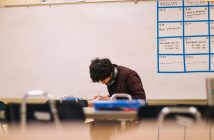For our new column, Ask an Educator, we turn to educators, whether teachers, tutors, or principals, to answer frequently asked questions from parents. To send in your question, email jessicasuotmaa@beijing-kids.com.
This week, our question is:
What are your thoughts on Finland’s new education system of eliminating subjects? Is this a good model for kids?
Answering for us is Sonya Porcher, teacher at 3e International School, previous Language Coordinator at Hyde Academy; Coordinator of Gifted Education at DeKalb Schools (US).
The move to eliminate subject-based education system in Finland is highly innovative and progressive. The idea of combining language and literature, science, math, and social studies throughout the school day is liberating for both students and teachers. Students will engage in more discussions and make more connections to the real world through project development.

I had an opportunity to visit Finland and observe their education system at the elementary level. In Finland, teachers are required to have Masters degrees, students feel comfortable in their learning environment (even calling their teachers by first name), resources are provided to engage students at multiple levels, and students do not begin their compulsory education until age seven. These are just a few reasons why Finland’s K12 education is currently ranked as top performing. The move to an interdisciplinary approach will place Finland even higher on the education ladder.
I have a teaching background in gifted education. One of the philosophies of gifted education is to develop the whole child while concentrating on his or her strengths. That being said, I think the Finns are onto something big! If children are introduced to content through an interdisciplinary approach at the primary or elementary level, they can focus more on their areas of interests and ability. However, this requires educators to be diverse in the four disciplines in order to assist students in building their knowledge.
An interdisciplinary approach, as designed by Finland’s education system, would allow students to problem-solve and use critical thinking through project-based learning. Students can collaborate with “experts from the field” to examine current environmental or social issues. Instead of preparing students to reach standards, they will excel beyond levels of understanding as a result of the connections made between content.
It is critical to focus on skills when preparing students for the 21st Century. We are no longer in an agrarian, industrial, or technological society. We are now in the age of knowledge. Teachers are no longer considered the vessels from which knowledge spews forth, but are the facilitators who design opportunities for students to express and explore prior knowledge while finding the common threads that exist between the content.
I think the Finland’s new education system is a good model for kids. Students with access to opportunities to collaborate and share ideas are academically enriched by these environments. I also think students who become key components of their classroom environment, able to orchestrate their learning, feel empowered to pursue the deepest level of self-propelled learning.
Photo: Courtesy of Sonya Porcher




